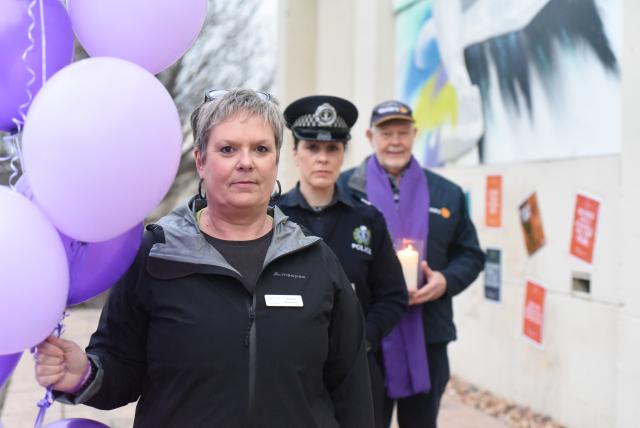
Charlotte Varcoe
COMMUNITY members came together on Thursday to help fight the stigma around overdose for the third year in a row.
International Overdose Awareness Day brought a number of community members from all walks of life to the Railway Lands to remember those who had passed away from an overdose and help reduce the stigma and the community perception of the issue.
The annual event first began in St Kilda in Melbourne in 2001 and has since grown into the world’s largest annual campaign to end overdose and acknowledge those personally affected without stigma.
New figures from the Pennington Institute regarding overdose showed there were a total of 2231 drug-induced deaths in Australia in 2021.
Of those deaths, 1675 of those were unintentional with 765 of those deaths being caused by opioids.
Benzodiazepines – which is a depressant drug which slows down the messages between the brain and the body – was the second highest unintentional drug-induced death with a total of 544.
There was a 71 per cent increase in unintentional drug-induced overdoses between 2001-2021 with Indigenous Australians having a higher percentage of deaths.
The most common age for these deaths was between 50 and 59 years of age with 70 per cent of deaths in 2021 being male.
Substance Misuse Limestone Coast project officer Sophie Bourchier spoke to the community members about the representation of the day.
“The latest report from the Pennington Institute clearly shows that overdose deaths continue to be driven by pharmaceutical drugs,” Ms Bourchier said.
“Although it is difficult to identify all the factors which have contributed to this dramatic increase, the key issues continue to stand out.”
She said these issues included a lack of access to affordable and evidence-based harm reduction interventions and dependance treatments which included pharmacotherapy as well as the increasing potency of drugs.
“The dominance of law enforcement to manage drug issues and the war on drugs has not been successful but it continues supporting the shame and guilt the people who use and their families feel,” Ms Bourchier said.
“The problematic language used in both the media and by people with influences is not helping and the way they refer to human beings is very hurtful and stops and delays people from looking for and going to treatment.
“Stigma makes people feel unwelcome at fault and not deserving of care which impacts their health outcomes and social outcomes.”
She said the stigma for drug-induced overdoses was evident within the Limestone Coast and urged the community to reassess how they perceive the issue.
“We know that in the media there is a lot of stigmatising language used rather than person-centered language so people are not thinking about the person themselves trying to access help,” Ms Bourchier said.
“If we use that language it is going to reduce their ability to access help because of the shame that is attached to it.”
She urged the community to remember that “humans are humans” and would take medication for whatever reason whether that be trauma base.
“People are unlucky that this happens to them and we have to support them in accessing help to get over that,” she said.
“Events like this in the community and raising awareness is really important because we need to talk about this and open it up as a conversation and support each other.”
The event was also supported by the Rotary Club of Mount Gambier West with the club’s president Ray Herbert congratulating those involved in hosting the evening.
“This is a wonderful opportunity for a community to recognise something like this which is a hidden challenge,” Mr Herbert said.
“Hopefully from this we can then create a better environment for people and support those who have gone through the process.
“We are very glad to be a part of this as a community partner and I know within Rotary there are a number of people who have been affected and they will be speaking at other events.”
The evening was also supported by SAPOL’s drug action team with Limestone Coast sergeant Jade Hill thanking those in attendance.
In an emergency, call 000. Call the National Alcohol and Other Drugs Hotline on 1800 250 015 or Family Drug Support on 1300 368 186. Counselling Online is available at counsellingonline.org.au







